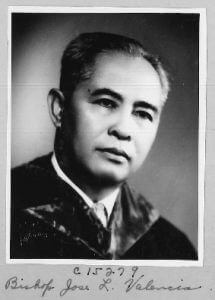
Board of Missions of the Methodist Episcopal Church , “Mission Photograph Album - Portraits #07 Page 0051,” UMC Digital Galleries, accessed November 27, 2018, http://catalog.gcah.org/
omeka/items/show/60663.
Leader among Central Conference Bishops
Born in Tagudin, Ilocos Sur Province, in 1898, Valencia grew up as a Roman Catholic, although he became acquainted with Protestants through the United Brethren mission near his home. He came from a family involved in the Filipino struggle for independence. His uncle was a guerrilla in the conflict with the U.S. after the Spanish-American War and was executed by the Americans. Nevertheless, Valencia determined to learn English and even joined the U.S. Navy. This military service brought him to the U.S., where he completed his high school education and entered Cornell College in Iowa, a Methodist school. Here as throughout his life, Valencia worked his way through school. While at Cornell, he became a Methodist through the influence of Enjie Tsukasaki, a former Shintoist from Japan. After a stint at Garrett Biblical Institute, he decided to enter the ministry. He entered Drew Theological Seminary and received a B.D. in 1929.
He returned to the Philippines and entered the pastoral ministry in the northwest part of the country, near his birthplace. He married and as a pastor received very low pay in his early churches. His biography relates journeys like those of a veritable Saint Paul: He walked, rode horses and carabao (a type of domesticated water buffalo), traversed flooding rivers on rickety ferries, and endured typhoons as he went from village to village. Although his theology was conservative, he believed the church should alleviate the plight of the poor. He became a district superintendent in 1938 and, during the Japanese occupation of the Philippines during the Second World War, reported many encounters with the Japanese, who were often searching for guerrillas.
After being elected bishop in 1948, he attended the meeting of the Council of Bishops held in 1950 and was dismayed to learn that the central conference bishops were not allowed to vote. On learning the reason for his unhappiness, Bishop Francis McConnell asked the council to reconsider this practice. The council immediately approved the right of all active bishops to vote, a change formally approved at the 1956 General Conference. Filipino bishops were elected for four-year terms, and Valencia was re-elected for four additional terms and served until 1968. During his tenure, a new arrangement was made with the United Church of Christ in the Philippines regarding comity. A number of educational, health, and social service institutions were established, and the Filipino church grew steadily under his administration. He died in 1994.
Taken from Linda Gesling, Mirror and Beacon: The History of Mission of The Methodist Church, 1939-1968. (New York: General Board of Global Ministries, The United Methodist Church, 2005), p. 183.




